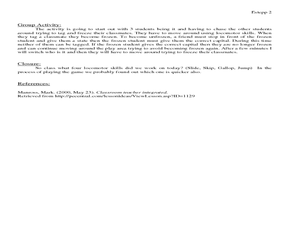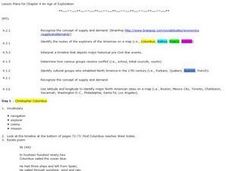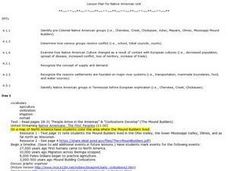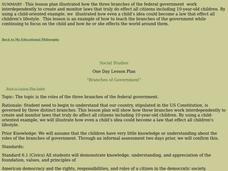Curated OER
Documents and Symbols and American Freedom
Students complete a unit of lessons on the documents, symbols, and famous people involved in the founding of the U.S. government. They create a personal bill of rights, write a found poem, design a flag, conduct research, and role-play...
Curated OER
It's Your Right: A Civil Rights Brochure
Learners examine the US Constitution, Bill of Rights, and Supreme Court cases in order to broaden their understanding of the US Judicial System. They research a variety of textual and Internet resources to create a tri-fold brochure,...
Curated OER
U.S. Supreme Court: February 1, 1790
In this writing prompt worksheet, students learn the date February 1, 1790 as the first meeting of the United States Supreme Court. Students then answer the following prompt: What type of person do you think it takes to be a member of...
Curated OER
iCivics: Court Quest
Learners explore the responsibilities of the Supreme Court. In this judicial branch lesson, students play an online game that requires them to respond to questions regarding the Supreme Court's responsibilities.
Curated OER
Ohio's U.S. Presidents
Fourth graders investigate the state of Ohio's claim to be the "Mother of Presidents." Nine U.S. presidents were from the state and their contributions and terms of office are examined in this lesson.
Curated OER
States and Capitals Activity
Students explore states and capitals. In this U.S. geography lesson plan, students practice locomotor skills playing Freeze Tag. Students generate the matching capital when given a specific state name in order to continue the game.
Curated OER
An Age of Exploration
Students investigate U.S. history by examining North American timelines. In this American exploration instructional activity, students research the events that led to Columbus finding America and participate in a jeopardy game regarding...
Curated OER
Pre-Colonial Native American Groups
Students investigate U.S. history by researching the Internet and taking a test. For this American Indian group lesson, students identify the many specific Native American tribes and their geographic locations. Students research the web...
Judicial Learning Center
Article III and the Courts
What's the best way to make sense of the Constitution? A helpful lesson contains both the text of Article III and annotation of each of its sections, breaking it down into easy-to-understand parts. It also includes links to a glossary...
Teaching Tolerance
Parallels Between Mass Incarceration and Jim Crow
Is history repeating itself? A riveting lesson examines the parallels between mass incarceration in the U.S. and the Jim Crow Laws of the past. Academics review Jim Crow Laws and compare them to mass incarcerations of African Americans....
Curated OER
What is a Court?
Young scholars examine and discuss the judicial branch of the U.S. government. They define what a court is, list three characteristics of a trial court and an appellate court, and analyze various trial and appeal situations.
Curated OER
Checks and Balances in Supreme Court Nominations
Students discover the system of Checks and Balances related to recent events prompting action by one or more of the three branches of government. They study the process for selecting and confirming a Supreme Court justice. They examine...
Curated OER
Branches of Government
Students explore the three branches of government. In this government and U.S. history lesson plan, students listen to a story about a boy who attempts to sponsor a bill to ban cartoons. Students interview three teachers who each...
Curated OER
Slavery: How did the Abolition Acts Affect the Slave Trade?
Students investigate the abolition of slavery by examining historical documents. In this U.S. history lesson, students view photographs of East African residents who were forced into slavery. Students write about the information they...
Curated OER
History of Supreme Court
Students study the role of the U.S. Supreme Court in U.S. history. They explore current events about the U.S. Constitution and discuss the Marbury v. Madison case from 1803. They identify the term "judicial review" and judicial...
Curated OER
FDR Tries to Pack the Supreme Court
Young scholars analyze the Court Reform Bill of 1937. In this Supreme Court lesson, students listen to their instructor present a lecture regarding the details Frankin Roosevelt and his attempt to pack the Supreme Court. Young scholars...
State Bar of Texas
Miranda v. Arizona
You have the right to remain silent—but why? Scholars analyze the nature of what has become known as the Miranda Rights. A short video along with paired group work and discussion opens the issue of the rights of the accused upon arrest....
State Bar of Texas
Roe v. Wade
At what point does the right of privacy end and the government begin? Scholars research rights under the Ninth Amendment to the Constitution. Using the 1973 Roe v. Wade Supreme Court case as a starting point, along with small group work...
Judicial Learning Center
Civil Rights and Equal Protection
Almost every American is familiar with the Supreme Court case of Brown vs. Board of Education. Far fewer understand the constitutional reasoning or the wide-ranging consequences of the ruling in the field of criminology. The interesting...
State Bar of Texas
Engel v. Vitale
Can you bow your head and pray in school? Scholars investigate the issue of school prayer with the Supreme Court case Engel v. Vitale. A short video clip along with paired group work helps viewers form opinions on the matter. They answer...
State Bar of Texas
Texas v. Johnson
If you saw a person burning an American flag, how would you feel? Scholars analyze the concept of freedom of expression and speech with the Supreme Court case Texas v. Johnson. A short video clip creates open discussion in pairs on the...
State Bar of Texas
Mapp v. Ohio
Do you have a search warrant? Scholars investigate the concept of illegal search and seizure through the eyes of the Supreme Court case Mapp v. Ohio. A short video clip along with paired group work opens discussion on the concept of how...
State Bar of Texas
Gideon v. Wainwright
How does a trial begin without a lawyer for the defendant? The 1963 Supreme Court case Gideon v. Wainwright serves as the backdrop for the study of the rights of the accused. Scholars use a short video along with paired discussion and...
Judicial Learning Center
Why Study Landmark Cases?
Why study landmark Supreme court cases? A helpful lesson offers a brief but valuable argument for the importance of these cases in the field of criminology. It introduces scholars to some key terms necessary for studying court cases and...
Other popular searches
- U.s. Supreme Court Cases
- U.s. Federal Court System
- U.s. Supreme Court Justices
- U.s. Court System
- U.s. Supreme Court Building
- U.s. Courtroom Procedures

























